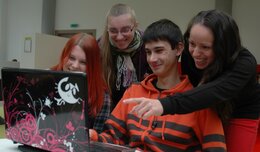Creative research activitiy at faculty is orientated towards these areas:
- Automotive Innovation Lab (AIL)
- Blockchain and FinTech (BlockFin)
- Cyber Security and IoT (CSI)
- Computer Vision and Computer Graphics (VGG)
- Intelligent Data and Systems with Applications (IDSA)
- Digital Systems on Chip (DSoC)
Research group focused on the development of intelligent sensors and communication architectures in the V2X environment and smart transport primarily for the purpose of research in the field of safety systems and related interconnectivity.
In ongoing projects, we focus specifically on the area of connected vehicles and related communication architectures, monitoring the fluidity and especially road safety in line with the European Commission 's vision for Vision Zero - to achieve almost zero fatalities on European roads by 2050.
Keywords:
Heterogeneous network management, V2X applications, V2X networking, Smart ADAS, Wireless Networks, 5G, LEO Satellite Internet
A diverse group of researchers at FIIT are working on a range of Blockchain academic and industry-driven research projects in a means to push further the technical development and innovation of the endless applications of Blockchain.
Current research projects of BlockFin include: connection to IoT platforms and it's usability, distributed systems, data mining and machine learning, anti-money laundering techniques, scalability and resiliency, smart contracts, non-fungible tokens (NFTs), blockchains interoperability, voting and election systems based on blockchain, privacy and security in blockchains and cryptocurrencies, asset sharing blockchain platforms, metaverse projects, decentralized finances (DeFi), and others.
The vision of the group lays in approaching Internet of Value in a horizon of 5 to 10 years and further empowering blockchain technology usage in society, actually, especially metaverse.
Keywords:
Blokchain, Blockchains Interoperability, Distributed Lefger Technology, Interoperability, Asset Sharing Blockchain Platforms, Nft, Anti-Money Laundering, Payment Gateways
Modern world is dependent interconnected systems, devices, sensors and their reliable operation. CSI research group tackles research challenges in areas of data security and privacy, cryptography, network and system security. CSI also pays special attention to the research of designing energy efficient and secure IoT devices and communication.
Keywords:
Computer Security, Risk Analysis, Security Standards, Security Model, Security Mechanisms, ISO/IEC 27000, Public Key Infrastructure, Access Control, Mobile Networks, Routing
Research in applications of computer vision and AI methods in the domains of medical imaging and digital pathology for automatic processing of radiological and microscopic images for the purpose of qualitative and quantitative analysis. Computer vision using Deep Neural Networks in medical domain applications and modeling of human visual attention is the main research focus of the group.
Keywords:
Medical Imaging, Object Detection and Object Recognition in 2D / 3D, Visual Attention Prediction, Augmented and Virtual Reality Applications, Big Data Visualization
The IDSA research group focuses on innovative data intelligence and computational intelligence solutions towards building intelligent systems and applications using data-driven technologies with respect to information privacy and security. Our research group explores various aspects of intelligent data and computing, as well as software development with focus on AIOps toward Responsible AI and business impacts. We are extending and adapting techniques of AIOps and software development to other areas with a particular interest in education.
Keywords:
Responsible AI, AIOps, eHealth Informatics, Telemedicine, Human-Computer Interaction (HCI), Information Privacy, Information Security, Natural Language Processing (NLP), NeuroEvolution, Social Robotics, Intelligence in Education and Engineering Processes
Digital design, verification, optimization and validation of integrated circuits and systems on chip.
Software development for systems on chip.
Software (web) development of IDE and EDA tools for integrated circuits – ASICDE project.
Keywords:
ASIC, FPGA, SoC, CPU, EDA, IDE, Digital RTL design, SystemVerilog

